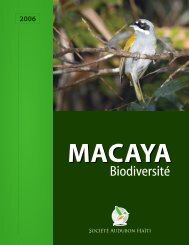Bwa-yo - Société Audubon Haiti
Bwa-yo - Société Audubon Haiti
Bwa-yo - Société Audubon Haiti
Create successful ePaper yourself
Turn your PDF publications into a flip-book with our unique Google optimized e-Paper software.
Pests and Diseases 161<br />
Species: Carica papaya L.<br />
Creole Name: papay<br />
Family: Caricaceae<br />
Diseases: A virus related to the cucurbit mosaic and transmitted by the green peach<br />
aphid (Myzus persicae) from cucumbers and watermelons causes a bitter flavor in fruits.<br />
Anthracnose (Glomerella cingulata and Colletotrichum gloeosporioides) enters wounds<br />
in ripe fruit. Dieback by an unidentified pathogen attacks crowns and leaves, causing<br />
rot. Stem end rot (Ascochyta caricae) affects <strong>yo</strong>ung fruits, causing premature fruit drop<br />
and attacks mature fruit as black circular spots. Root rot (Phytophtora spp.) results in<br />
wilt and eventual death. The powdery mildew (Oidium spp.) attacks leaves of seedlings<br />
under humid, poorly-ventilated conditions.<br />
References: Mortensen and Bullard, 1970; Tourigny, 1987.<br />
Species: Casuarina equisetifolia L. ex J.R. & G. Forst.<br />
Creole Names: bwa pen, pich pen, kazowina<br />
Family: Casuarinaceae<br />
Insect Pests: A stem borer (Apate monachus) attacks both living and dead wood, retarding<br />
growth, deforming trunks, and making them susceptible to breakage in high winds<br />
in Central America and the Caribbean. A buprestid beetle (Coleoptera: Buprestidae)<br />
feeds on the inner bark and outer wood tissues of the stem and a cossid moth<br />
(Lepidoptera: Cossidae) bores into the stems of trees in the Philippines. The larvae of<br />
an undetermined twig-girdling insect bore into the stem and feed on the stem bark and<br />
cambial tissues in the· Philippines. Long-horned beetles (Neoclytus cordifer and<br />
Chloridafestiva) attack trees in Central America. The stingless bee (Trigonia silvestriana)<br />
wounds trees by cutting bark incisions. Larvae of Bootamomyia infest seed in the<br />
Caribbean. Nymphs of the spittle bug (Clasoptera undulata) suck sap from flowers,<br />
leaves, stems, and soft branches. Other insect pests include: crickets and grasshoppers<br />
(Chondracis rosea, Schistocerca gregaria), a defoliator (Lymantia xylina), and sap<br />
feeders (Icerya spp.). Several species of ants eat the seed, hampering sowing success in<br />
the nursery, and inhibiting natural regeneration of the species worldwide. The species is<br />
vulnerable to crickets (Orthoptera: Gryllidae) that clip seedling stems or defoliate in the<br />
nursery. Twig girdlers attack the tree in southern Florida, cutting off new shoots and<br />
branches, resulting in deformed stems. Major seedling pests in India are the cricket<br />
(Brachytrupes achatinus), a bark-eating caterpillar (Arbela tetronis), a longicorn<br />
(Coelosterna scabrata), and grubs of the rhinoceros beetle (Oryctes rhinocerus).<br />
Diseases: Notable fungal diseases observed among tree nurseries in <strong>Haiti</strong> include: the<br />
powdery mildew (Oidium spp.) that attacks leaves of seedlings under humid, poorlyventilated<br />
conditions; foliar blights (Alternaria, Cercospora, and Phytophtora); and<br />
root rot (Pythium, Phytophtora, and Rhizoctonia). Trees grown in unfavorable conditions<br />
succumb to major root diseases caused by Pseudomonas solanacearum,<br />
Trichosporium vesiculorum, and Rhizoctonia spp., particularly on wet and poorlydrained<br />
sites. The mushroom root rot (Clitocybe tabescens (Scop.) Bres.) causes a high<br />
rate of mortality on sandy soils in S. Florida. Dieback and stem canker caused by<br />
Diplodia natalensis occur in southern Florida and Puerto Rico.<br />
References: Brazza, 1987a; Brazza, 1988a; CATIE, 1992; Josiah and Allen-Reid, 1991;<br />
Morton, 1980; NFTA 1990; Runion et al., 1990; Tourigny, 1987.



